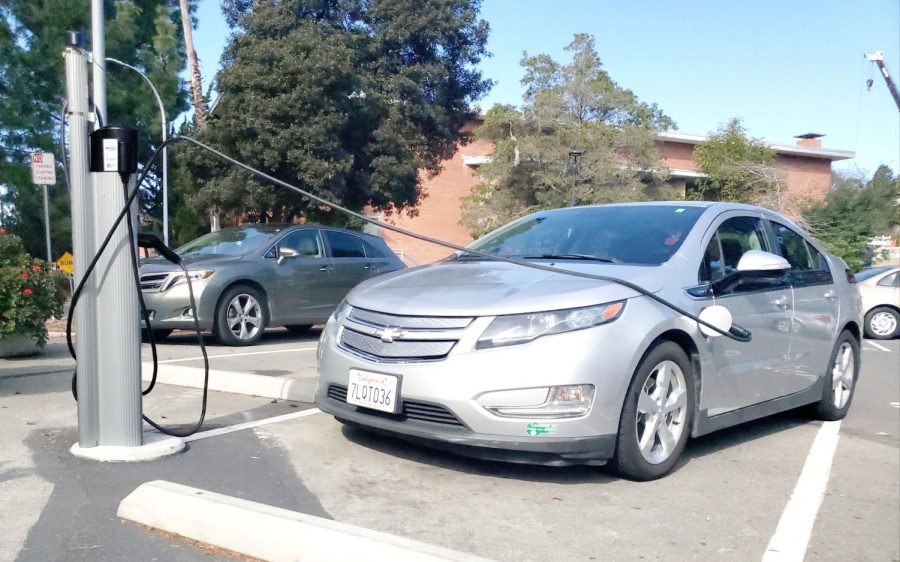Campus electricity more costly than home
Christian Medina / The Advocate
A Chevrolet Volt is plugged into the EV charging station in Lot 9. Only EV’s and PHEV’s are allowed to park in the designated parking spaces.
Feb 4, 2020
Tax credits and low upkeep costs are just some benefits and conveniences electric car owners receive.
For the few students and staff at Contra Costa College who drive electric vehicles (EVs), the EV charging stations in Lot 9 are an extra convenience to take advantage of.
The charging stations, installed over the summer session, are supplied by ChargePoint — a nationwide provider. These spaces are marked by the letters “EV” within a green square and a plug symbol.
In order to use the chargers, a ChargePoint account must be made through the app which is linked to the user’s personal payment information since credit card scanners are not available on the machines.
Members have the option to scan a QR code on the machine to open the app or have a membership card issued to them to be used at any ChargePoint station.
ChargePoint’s app allows users to be notified when their car has been fully charged, view payment information and find available stations.
“Tap to charge” is a feature that unlocks the plug for a frictionless experience. Technology Systems Manager James Eyestone said, “If you use it enough, you don’t even need the screen.”
The built-in screens feature help assistance, a how-to-use guide and language settings.
Liberal Arts Division Dean Jason Berner, the owner of a Toyota Prius Prime plug-in electric vehicle (PHEV), uses the charging stations every day and finds that EV chargers on campus are beneficial.
Berner’s ChargePoint app experience went rhythmically except on one instance in the fall semester when the service experienced a bug and denied him access to plug in his hybrid for a week.
Library coordinator Andrew Kuo says his Nissan LEAF can travel roughly 20 miles on an hour of charging. The LEAF’s maximum range is 150 miles.
Kuo only plugged in his car twice in the fall semester because he says charging on campus is more expensive than at home where he is billed $0.30 per kilowatt hour.
Owners parking their cars in these spaces can expect to be charged $0.42 per kilowatt hour and this is after paying for a Contra Costa Community College District parking permit.
The first four hours are free but thereafter the machines will charge $4 an hour.
While ChargePoint manages the billing system, Eyestone says the district chancellor’s cabinet determined this system for encouraging EV owners to move their car to another space so that others can access the charging stations.
Only EVs and PHEVs are allowed to park in the designated spaces where a valid district parking permit must be presented along with the car being plugged in.
Violators will be issued a $40 citation by Police Services.
The ticket cost is almost 84 percent of the price of a parking permit.
According to Police Services Lt. Thomas Holt, 20 warning tickets have been written since Oct. 30 and 12 citations pertaining to EV parking violations were written since Dec. 2.
Berner, along with the rest of the campus’ staff, receive free parking, though he must pay to charge his EV. No discounts or special incentives are offered by the college district for parking an electric car.
“I don’t mind paying a little bit,” Berner said. “I think, if a student pays for a parking permit, I’d like to see something where that’s (EV parking) included or maybe a parking permit with a small extra charge,”



